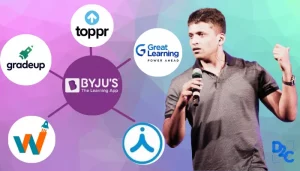The 7,500-crore (~1 billion USD) edtech sector in India is grappling with what seems to be its biggest challenge ever (market size as per KPMG estimates). Amidst downsizing, mass layoffs and closures, the smart ones are widening their scope and embracing a hybrid delivery model to make the most of their early success. While players such as Byju’s and Unacademy have launched offline classes and expanded their repertoire, the likes of Great Learning and upGrad have added new programmes and courses with gusto. The idea is to look beyond the primary user base of school and college students and woo working professionals, and seize every channel they are present in.

Great Learning, the edtech brand acquired by Byju’s last year, has expanded its portfolio to 60 products, spanning across online and offline learning. These include upskilling programmes, free online classes and B2B offerings for firms that want to upskill their staff. “The B2B offering for companies has been seeing 500% growth year-on-year, albeit on a small base. The working professionals segment will continue to be our main focus area,” says Mohan Lakhamraju, founder and CEO, Great Learning. Prior to the pandemic, a third of its business came from offline classes.
Online degree programmes are also emerging as an important focus area for Great Learning, with educational programmes from institutes around the world now available online at a fraction of the cost one would pay on-campus. What is also boosting the demand for such courses is that professionals can study at their convenience without having to take time off work.

Working professionals remain the core target audience for online higher education firm upGrad. It has now expanded its university network and portfolio to offer undergraduate programmes, studies abroad, campus and job related programmes, as well as masters and doctoral educational offerings. Mayank Kumar, co-founder and MD, upGrad, says the aim is to offer programmes for anyone in the 18-50 years age bracket, in sync with the brand’s goal of becoming the leader in the ‘life-long learning’ segment. Kumar explains that its programmes like business analytics and blockchain grew multifold between FY21 and FY22.
If there is one thing the pandemic years have shown it is that hybrid classrooms are the future. “The modern learning environment needs reinforcement of technology in a way that it ensures better understanding of the curriculum to drive better outcomes,” says Manan Khurma, founder and chairman of Cuemath, an online math learning platform. Cuemath started with a home-based tutoring model, pivoted to online learning in 2017, and is advocating the blended model of learning as the way forward.

In February, Byju’s too announced the launch of Byju’s Tuition Centre, which brings together online and offline learning experiences for students in classes 4-10. It said it would launch 500 centres across 200 cities by the end of CY22, underscoring the need for ed-tech players to go hybrid.
Navigating the learning curve
Narayanan Ramaswamy, national leader, education and skill development for KPMG in India, says the edtech market will touch 25 billion USD over the next 10 years. Edtech players are no doubt facing challenges with the return of offline institutes after two years, but he points out that the current scenario must be viewed in the context of the extraordinary acceleration the sector saw during the pandemic. “Yes, there is a dip in demand currently, but over time, the demand in edtech will exceed the supply. Educational infrastructure in India is simply not enough. We do not have enough brick-and-mortar institutes to meet the needs of our students, and so demand for edtech offerings will only increase,” he says.
Pricing is a key factor in the democratisation of education. Edtech firms must provide quality services at affordable prices to stay relevant, says PN Sudarshan, partner and TMT industry leader, Deloitte India. Affordable devices and broadband connectivity are other pre-requisites.
